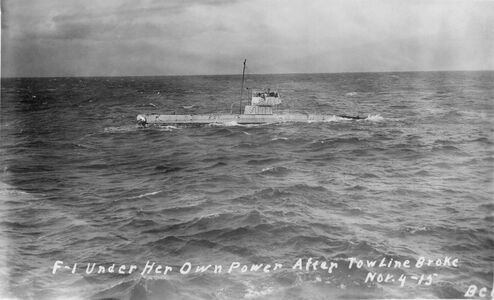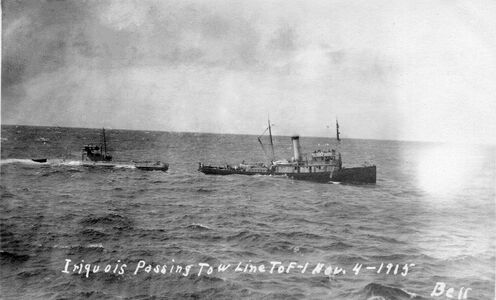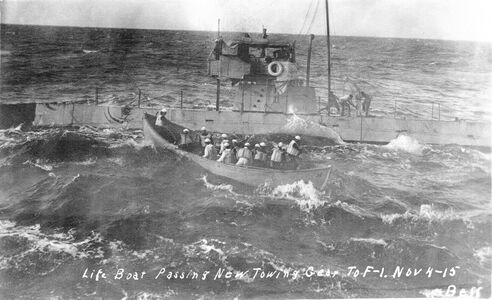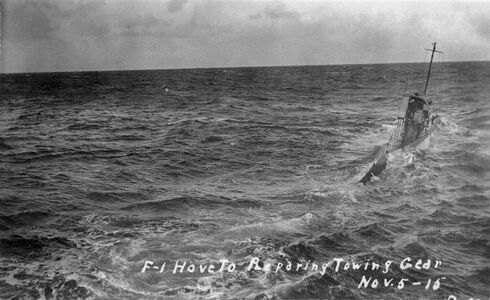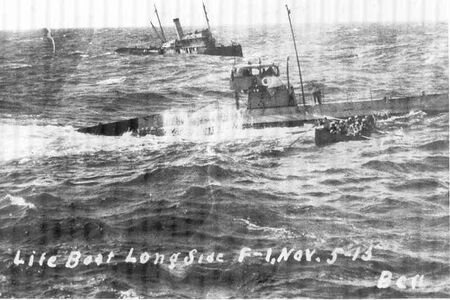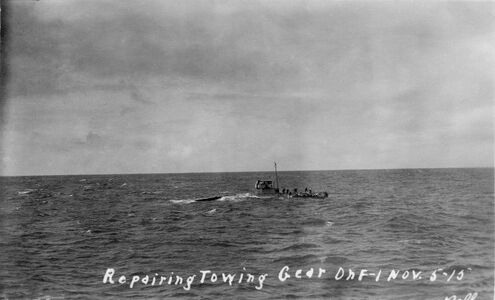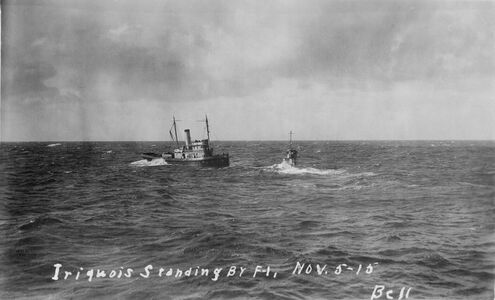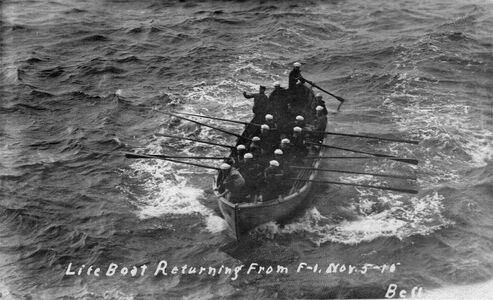F-1: Difference between revisions
No edit summary |
Pbcjohnston (talk | contribs) Added towing pics |
||
| (11 intermediate revisions by 2 users not shown) | |||
| Line 1: | Line 1: | ||
[[File:F- | [[File:New Header F-class.jpg]] | ||
<div style="text-align: justify;"><span style="color:#00008B"> | [[File:F-1 aground off Watsonville, Ca, Oct. 12, 1912.jpg|left|500px]] | ||
<div style="text-align: justify;"><span style="color:#00008B">The F-1 was moored to a buoy off Watsonville when she was struck with a large wave. The Mooring line parted and the sub drifted into the pier before being washed ashore before the crew could get the vessel under control. | |||
[[File: | <center>[[File:RWB_starbar.jpg]]</center> | ||
(Newspaper Story)<br> | (Newspaper Story) PHILADELPHIA INQUIRER, OCT 12, 1912<br> | ||
Watsonville, CA Oct 11, 1912 <br> | Watsonville, CA Oct 11, 1912 <br> | ||
Gustave August Schroeder of Milwaukee and T. James Turbett of Newark, N. J., seamen on board the United States submarine F-1, were drowned today when a great wave swept over the little craft, which later went aground near port Watsonville. | Gustave August Schroeder of Milwaukee and T. James Turbett of Newark, N. J., seamen on board the United States submarine F-1, were drowned today when a great wave swept over the little craft, which later went aground near port Watsonville. | ||
The extent of the damage to the submarine has not been determined. Low tide left it upright in the sand in three feet of The F-1 is the holder of the world's record for submarine diving, having gone down 283 feet in San Francisco Bay, September 5, | The extent of the damage to the submarine has not been determined. Low tide left it upright in the sand in three feet of water. The F-1 is the holder of the world's record for submarine diving, having gone down 283 feet in San Francisco Bay, September 5, 1912. She was christened the Carp, and was renamed November 17, 1911. She was in command of Lieutenant James B. Howell. | ||
Schroeder and Turbett were on watch at daybreak with a third seaman when a rising sea tore the submarine from its moorings to a buoy. Before the seamen could get control of the steering gear the deck was engulfed in a wave and Schroeder and Turbett were carried overboard. | Schroeder and Turbett were on watch at daybreak with a third seaman when a rising sea tore the submarine from its moorings to a buoy. Before the seamen could get control of the steering gear the deck was engulfed in a wave and Schroeder and Turbett were carried overboard. | ||
| Line 18: | Line 18: | ||
The thirteen remaining members of the crew worked for six hours to save | The thirteen remaining members of the crew worked for six hours to save | ||
the craft from being beached, but had to abandon her, and a few minutes later rammed her nose into the sand, A tug will convey her to Mare Island Navy Yard for repairs. There is about three feet of water in her hold, but she is believed to be seaworthy. | the craft from being beached, but had to abandon her, and a few minutes later rammed her nose into the sand, A tug will convey her to Mare Island Navy Yard for repairs. There is about three feet of water in her hold, but she is believed to be seaworthy. | ||
<center>[[File:RWB_starbar.jpg]]</center> | |||
The submarine was refloated a few days later on October 18 and towed to Mare Island for repair. | |||
<small>Photo in the private collection of Ric Hedman</small> | <small>An Original Photo in the private collection of Ric Hedman <br>This is one half of an original unpublished stereo photo. The other half was not in as good a condition as this half.</small> | ||
[[File:Red bar sub new.jpg]] | |||
[[File:F-1 aground 1.jpg|left|500px]] | |||
A port quarter view of the F-1 aground off Watsonville, CA. on October 11, 1912. This photo has been misidentified by other sources as the [[H-3|'''H-3 (Submarine No. 30)''']] aground off Point Sur, CA. | |||
<small>Photo in the private collection of Ric Hedman.</small> | |||
[[File:Red bar sub new.jpg]] | |||
[[File:F-1 aground 2.jpg|left|500px]] | |||
Another port side view of F-1 aground off Watsonville, CA. on October 11, 1912. They were lucky that only a moderate sea was running and the bottom was sandy. Anything else and the boat could have been destroyed. | |||
<small>Photo in the private collection of Ric Hedman.</small> | |||
[[File:Red bar sub new.jpg]] | |||
[[File:F-1 post card.jpg|left|500px]] | |||
An interesting post card written by an F-1 crewmember in March of 1913. The card reads exactly as follows, misspellings and all: | |||
''San Dieago, Cal. March 1- 1913'' | |||
''Dear Dave'' | |||
''I tried to get out to see you before I left but as I shipped on the 13 - and at 10:PM I left for here - am asigned to the US Submarine F-1 for instructions 6 mon school. And if I make good a rate and one dollar a dive. Don't forget to write to a fellow ocasionally. Give my regards to the folks and many of my Best Wishes to Sis.'' | |||
''Your old Shipmate'' | |||
''J G Messary'' | |||
<small>Image in the private collection of Ric Hedman.</small> | |||
[[File:Red bar sub new.jpg]] | |||
[[File:F-1 and crew.jpg|left|500px]] | |||
This photo shows the F-1 in drydock at the Mare Island Navy Yard, California, circa March of 1914. The men on the deck comprise about 1/3 of the crew. Tentative identifications have been made for three of the men. | |||
On the left is a Chief Petty Officer. He is believed to be Chief Gunners Mate Dudley Strough. | |||
The man standing second from the right is believed to be Electricians Mate 1st Class Ray Elsworth Scott. | |||
The Chief seated in the center is thought to be CMM John Peter Albert Messang. | |||
These three men are known to have died in the sinking of the F-1 when she was rammed by the F-3 on Dec 17, 1917. The other men are yet to be identified. The submarine in the dock with the F-1 should be the F-2. | |||
<small>Photo in the private collection of Ric Hedman.</small> | |||
[[File:Red bar sub new.jpg]] | |||
[[File:F-1 bow.jpg|left|300px]] | |||
F-1 is seen moored in a nest of the other F-class boats at Pier 5 in Honolulu Harbor in 1915. Sand Island is in the far background. The submarine base in Pearl Harbor was still under construction and was not yet ready to accommodate boats. The Navy leased piers in downtown Honolulu for submarines at the foot of Bishop St. | |||
<small>Photo in the private collection of Ric Hedman.</small> | |||
[[File:Red bar sub new.jpg]] | |||
[[File:F-1 in Honolulu Harbor.jpg|left|500px]] | |||
F-1 is seen pulling up to Pier 5 in Honolulu Harbor, Hawaii, 1915. Her crew is topside preparing to moor. There are officers standing on deck aft of the fairwater. The F-boats were only billeted for two officers so these extra men were likely aboard for training. An officer stands atop the open bridge at the topside helm, conning the boat into the pier. She has slight forward way on, approximately 2-3 knots. There is no engine exhaust present so she is maneuvering on the battery. The engines used on these boats could not be reversed, so close-in maneuvering like this was done on the battery. | |||
<small>U.S. Navy photo.</small> | |||
[[File:Red bar sub new.jpg]] | |||
<center> | |||
<gallery mode="packed" perrow=3 widths="300px" heights="200px"> | |||
File:F-1 towing Nov 15 110415-1.jpg | |||
File:F-1 towing Nov 15 110415-2.jpg | |||
File:F-1 towing Nov 15 110415-3.jpg | |||
</gallery> | |||
</center> | |||
In the fall of 1915 the remaining F-boats were ordered back to the mainland after the F-4 sank. All three got underway and rendezvoused off Honolulu, meeting up with the towing ships. The towing hawsers were passed over and made fast and the operation began the slow movement to California. These photos show the F-1 under tow to California from Hawaii, November 4, 1915. This was a tough towing operation, with the line parting several times in the moderate sea, requiring a time consuming and dangerous operation to re-establish the towing hawser. A boat from the [https://www.navsource.org/archives/04/acr8/acr8.htm '''USS Maryland (Armored Cruiser No. 8)'''] is bringing a newly spliced hawser to the sub, and is also bringing supplies for the crew. Conditions onboard the submarine were not good during the transit, the crew simply had to endure. The [https://www.navsource.org/archives/09/47/47046.htm '''USS Iroquois (Fleet Tug No. 46)'''], towing the F-2, is assisting with reestablishing the tow. Note that the photographer misspelled "Iriquois" | |||
<small>Photos courtesy of the Vallejo Naval & Historical Museum via Darryl Baker.</small> | |||
[[File:Red bar sub new.jpg]] | |||
<center> | |||
<gallery mode="packed" perrow=3 widths="300px" heights="200px"> | |||
File:F-1 towing Nov 15 110515-4.jpg | |||
File:F-1 under tow.jpg | |||
File:F-1 towing Nov 15 110515-5.jpg | |||
File:F-1 towing Nov 15 110515-6.jpg | |||
File:F-1 towing crew in boat Nov 15 110515-7.jpg | |||
</gallery> | |||
</center> | |||
The next day the combined crews did it all over again. The towing hawser parted for at least the second time and Maryland's crew once again rowed out to help replace it. Towing might seem like an easy operation, but in fact it is a slow and dangerous process even in the moderate sea they had here. The mini fleet did eventually arrive at San Francisco Bay, where the submarines were cast off to sail up to the Mare Island Navy Yard under their own power. The submarine crews breathed a huge sigh of relief when they arrived. | |||
<small>Photos courtesy of the Vallejo Naval & Historical Museum via Darryl Baker, and the Pacific Fleet Submarine Museum.</small> | |||
[[File:Red bar sub new.jpg]] | [[File:Red bar sub new.jpg]] | ||
Latest revision as of 19:18, 17 April 2025
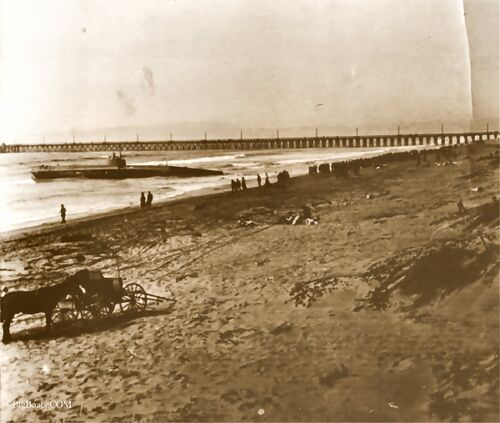
(Newspaper Story) PHILADELPHIA INQUIRER, OCT 12, 1912
Watsonville, CA Oct 11, 1912
Gustave August Schroeder of Milwaukee and T. James Turbett of Newark, N. J., seamen on board the United States submarine F-1, were drowned today when a great wave swept over the little craft, which later went aground near port Watsonville.
The extent of the damage to the submarine has not been determined. Low tide left it upright in the sand in three feet of water. The F-1 is the holder of the world's record for submarine diving, having gone down 283 feet in San Francisco Bay, September 5, 1912. She was christened the Carp, and was renamed November 17, 1911. She was in command of Lieutenant James B. Howell.
Schroeder and Turbett were on watch at daybreak with a third seaman when a rising sea tore the submarine from its moorings to a buoy. Before the seamen could get control of the steering gear the deck was engulfed in a wave and Schroeder and Turbett were carried overboard.
The third seaman saved himself, by grasping the railing. He was badly bruised and almost drowned when rescued a few moments later by his comrades. The body of Turbett was washed ashore late today, Schroeder's body has not been recovered.
The thirteen remaining members of the crew worked for six hours to save the craft from being beached, but had to abandon her, and a few minutes later rammed her nose into the sand, A tug will convey her to Mare Island Navy Yard for repairs. There is about three feet of water in her hold, but she is believed to be seaworthy.
The submarine was refloated a few days later on October 18 and towed to Mare Island for repair.
An Original Photo in the private collection of Ric Hedman
This is one half of an original unpublished stereo photo. The other half was not in as good a condition as this half.
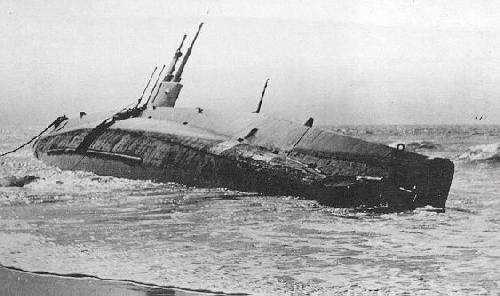
A port quarter view of the F-1 aground off Watsonville, CA. on October 11, 1912. This photo has been misidentified by other sources as the H-3 (Submarine No. 30) aground off Point Sur, CA.
Photo in the private collection of Ric Hedman.
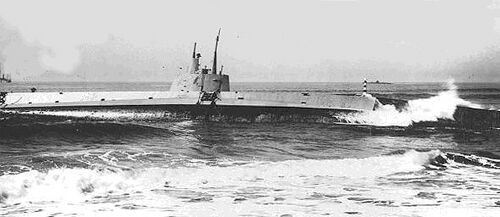
Another port side view of F-1 aground off Watsonville, CA. on October 11, 1912. They were lucky that only a moderate sea was running and the bottom was sandy. Anything else and the boat could have been destroyed.
Photo in the private collection of Ric Hedman.
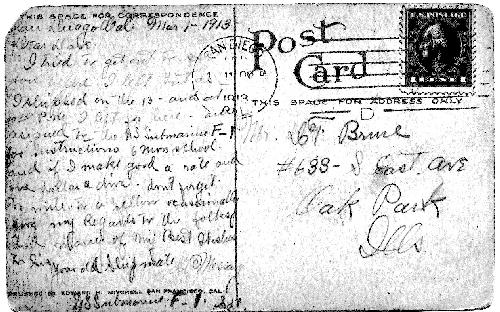
An interesting post card written by an F-1 crewmember in March of 1913. The card reads exactly as follows, misspellings and all:
San Dieago, Cal. March 1- 1913
Dear Dave
I tried to get out to see you before I left but as I shipped on the 13 - and at 10:PM I left for here - am asigned to the US Submarine F-1 for instructions 6 mon school. And if I make good a rate and one dollar a dive. Don't forget to write to a fellow ocasionally. Give my regards to the folks and many of my Best Wishes to Sis.
Your old Shipmate
J G Messary
Image in the private collection of Ric Hedman.
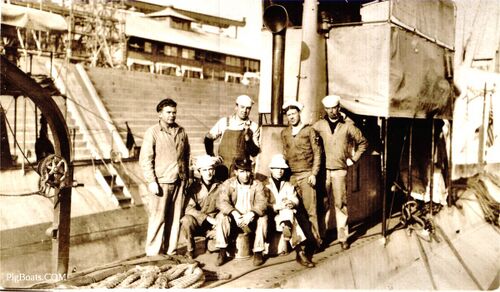
This photo shows the F-1 in drydock at the Mare Island Navy Yard, California, circa March of 1914. The men on the deck comprise about 1/3 of the crew. Tentative identifications have been made for three of the men.
On the left is a Chief Petty Officer. He is believed to be Chief Gunners Mate Dudley Strough.
The man standing second from the right is believed to be Electricians Mate 1st Class Ray Elsworth Scott.
The Chief seated in the center is thought to be CMM John Peter Albert Messang.
These three men are known to have died in the sinking of the F-1 when she was rammed by the F-3 on Dec 17, 1917. The other men are yet to be identified. The submarine in the dock with the F-1 should be the F-2.
Photo in the private collection of Ric Hedman.
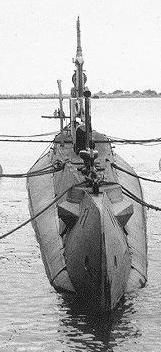
F-1 is seen moored in a nest of the other F-class boats at Pier 5 in Honolulu Harbor in 1915. Sand Island is in the far background. The submarine base in Pearl Harbor was still under construction and was not yet ready to accommodate boats. The Navy leased piers in downtown Honolulu for submarines at the foot of Bishop St.
Photo in the private collection of Ric Hedman.
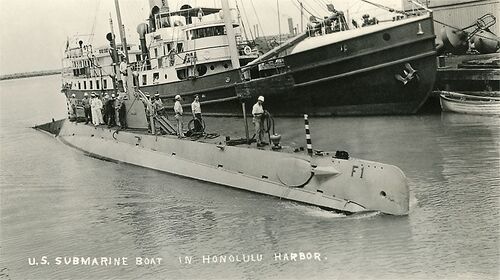
F-1 is seen pulling up to Pier 5 in Honolulu Harbor, Hawaii, 1915. Her crew is topside preparing to moor. There are officers standing on deck aft of the fairwater. The F-boats were only billeted for two officers so these extra men were likely aboard for training. An officer stands atop the open bridge at the topside helm, conning the boat into the pier. She has slight forward way on, approximately 2-3 knots. There is no engine exhaust present so she is maneuvering on the battery. The engines used on these boats could not be reversed, so close-in maneuvering like this was done on the battery.
U.S. Navy photo.
In the fall of 1915 the remaining F-boats were ordered back to the mainland after the F-4 sank. All three got underway and rendezvoused off Honolulu, meeting up with the towing ships. The towing hawsers were passed over and made fast and the operation began the slow movement to California. These photos show the F-1 under tow to California from Hawaii, November 4, 1915. This was a tough towing operation, with the line parting several times in the moderate sea, requiring a time consuming and dangerous operation to re-establish the towing hawser. A boat from the USS Maryland (Armored Cruiser No. 8) is bringing a newly spliced hawser to the sub, and is also bringing supplies for the crew. Conditions onboard the submarine were not good during the transit, the crew simply had to endure. The USS Iroquois (Fleet Tug No. 46), towing the F-2, is assisting with reestablishing the tow. Note that the photographer misspelled "Iriquois"
Photos courtesy of the Vallejo Naval & Historical Museum via Darryl Baker.
The next day the combined crews did it all over again. The towing hawser parted for at least the second time and Maryland's crew once again rowed out to help replace it. Towing might seem like an easy operation, but in fact it is a slow and dangerous process even in the moderate sea they had here. The mini fleet did eventually arrive at San Francisco Bay, where the submarines were cast off to sail up to the Mare Island Navy Yard under their own power. The submarine crews breathed a huge sigh of relief when they arrived.
Photos courtesy of the Vallejo Naval & Historical Museum via Darryl Baker, and the Pacific Fleet Submarine Museum.
Page created by:
Ric Hedman & David Johnston
1999 - 2023 - PigBoats.COM©
Mountlake Terrace, WA, Norfolk, VA
webmaster at pigboats dot com

